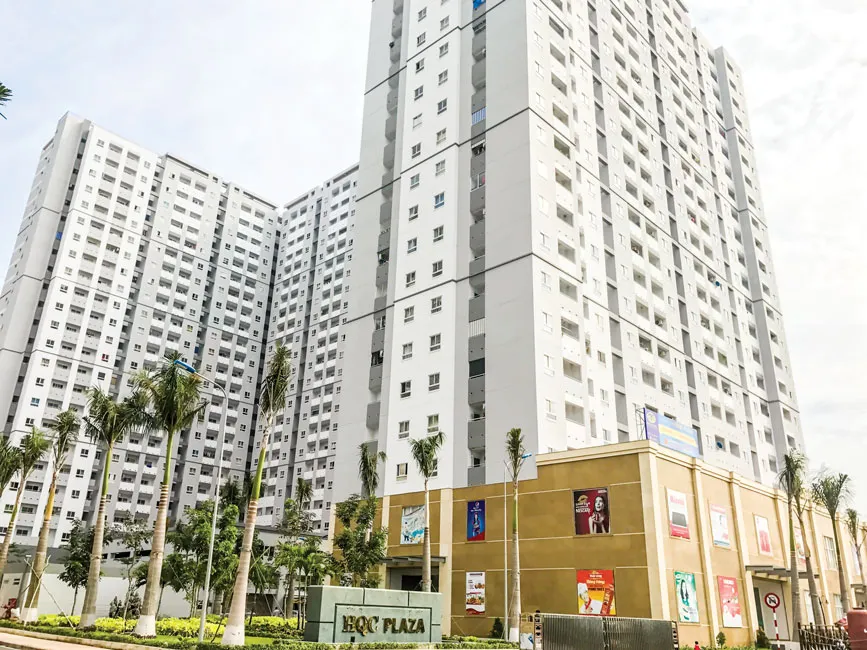
However, the goal of HQC to become a leading real estate developing company in Vietnam took a tremendous dive and faltered in its many ventures over the years.
Pioneers in social housing
The Hoang Quan Consulting Trading Service Real Estate Corporation initially set itself as real estate brokers. The company then subsequently increased its capital and in the following years established a series of ventures that operated in various other real estate sectors. The company goal strongly bordered on becoming Vietnam’s leading real estate developing company. In 2005, HQC had a capital of VND 20 bn, and by 2009 it had risen to VND 400 bn. In March 2007, HQC decided to change the operating model from being a limited company to a joint stock company. In 2010, HQC officially listed shares on HOSE at a reference price of VND 31,000 per share. This was seen as a turning point that brought positive changes for HQC, and the company received many awards and accolades in the field of real estate and such related enterprises.
At the 2013 annual shareholders meeting, HQC suddenly announced it was investing in the social housing sector, naming HQC Plaza and HQC Hoc Mon as their next projects. When both these projects were completed ahead of schedule, HQC made a name in the industry. After this success, HQC moved fast in partnering with larger corporations at home and abroad. In 2014, HQC signed a comprehensive strategic cooperation with LG and Hyundai in the field of commerce and services, as well as for providing equipment for HQC invested projects. In 2015, HQC signed another comprehensive strategic cooperation with Viglacera Corporation, and also an investment cooperation agreement with Global Emerging Markets Group (GEM). In its 2015 annual shareholders meeting HQC approved increasing its target ten times compared to 2014, all due to the benefits received in an VND 30,000 bn interest rate support package.
Fast expansion
The success of the first social housing project was also a premise for HQC to continuously be able to increase its capital, and begin expanding its operations across many provinces and cities across the country. From VND 400 bn in 2009, HQC chartered capital reached VND 4,000 bn in 2016. However, the scale and quality of development works executed by HQC were still low in performance standards. For example, in 2014 HQC only completed 21.3% of the plan, in 2016 HQC completed 22% of the plan, in 2017 it completed 32.7%, in 2018 it completed 24%, and in 2019 it was able to complete only 29% of their planned target.
Not only were business activities regressing, but HQC social housing projects were constantly embroiled in disputes with customers buying houses, along with many faults in construction and business dealings. For instance, the Bac Vinh Hai social housing project in Khanh Hoa Province violated several conditions in Housing Law of 2014. According to the conclusion made by Inspector No. 643 of the People's Committee of Khanh Hoa Province, HQC made many mistakes when implementing the project, including delay and violations on the conditions to sell social housing units.
Specifically, HQC was not forthright in providing documents on acceptance of foundation works as a basis for the Department of Construction to confirm that the project was eligible for sale, as well as not providing a written approval of the foundation test of a competent authority. In addition, the investor violated the regulations on subjects and conditions to receive the social housing support policies which meant selling social housing at a commercial price to foreigners. In particular, HQC also collected money from selling social housing in excess of 70% of the value of the apartment which was against regulations, and collecting social housing rent deposit in excess of 50% of the apartment value.
Stock at rock bottom
Steadily plummeting business results contributed to HQC share prices continuously falling to bottom, and in the last sessions of 2019, HQC even dropped to below VND 1,000 per share. Although the stock price has continuously hitting bottom, at the General Shareholders Meeting, the HQC leaders always drew a rosy picture of impressive business targets. However, at the 2019 annual shareholders meeting, Mr. Truong Anh Tuan, Chairman of the Board of Directors, acknowledged that HQC faced many difficulties, such as delayed projects, negative equity surplus of more than VND 500 bn, large inventories, slow sales, and the stock price hitting rock bottom.
Despite acknowledging all the difficulties facing HQC, the Board of Directors submitted a revenue plan of VND 1,513 bn, profit after tax of VND 145 bn which was 2.8 times and 3.4 times as that in 2018, and an expected dividend rate of 5%. Mr. Tuan even boldly sets goals for the following years, of revenue in 2020 to reach VND 3,000 bn, double that of 2019; profit after tax of VND 300 bn; 2021 revenue at 5,000 bn; and profit after tax at 500 bn. However, at the Annual General Shareholders Meeting of 2020 held on 30 May, the Board of Directors unexpectedly lowered the target for 2020, showing a turnover of VND 1,219 bn, and an after-tax profit of VND 63 bn. This was accompanied with a target until 2024 and the stock prices to return to par value.
Having difficulty with the social housing model, HQC decided to increase its proportion of investment in commercial real estate, which focuses on the segment of average housing, real estate, offices, tourism and resorts. However, this move to switch to a lucrative real estate model came too late for HQC because by this time other competitors had already overrun and saturated this market across the country.




















